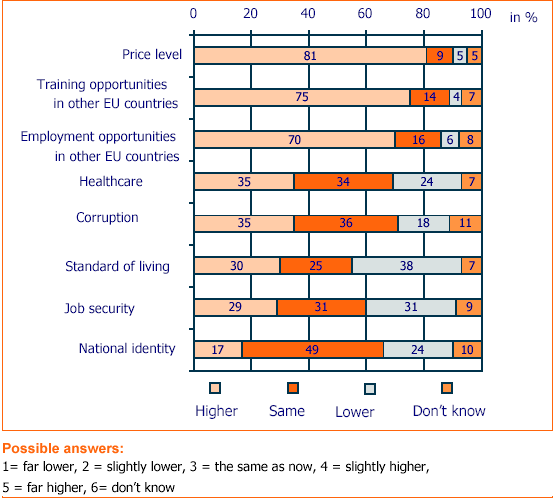People in the ten countries due to join the European Union (EU) after 1 May 2004 have mixed feelings about it, according to the latest EU Index survey conducted by GfK Ad Hoc Research Worldwide. Employment and training opportunities overseas are offset by fears of price increases at home, and more corruption.
The 9,557 respondents were asked how they thought various aspects of life would develop following their country's accession to the EU. These aspects included job security, the healthcare system, employment and training opportunities in other EU member states, standard of living, corruption, prices and whether national identity would strengthen or weaken.
Whilst most respondents see benefits from cross-border mobility, many expect corruption to worsen and almost all expect prices to rise. At the same time, most of those questioned did not believe that being part of the EU would mean a loss of cultural identity and traditions in their own country.
Assessment of how various factors affecting the standard of living might develop
Important - note that the first section of each bar indicates 'higher' rather than 'better' - it therefore has a different connotation in the two bars representing 'Price Level' and 'Corruption'.

Source: GfK Ad Hoc Research Worldwide, EU Index, November 2003
NB: these are overall figures - for some aspects, the responses varied widely between the different countries.
Irrespective of their nationality, three in four respondents believe that EU membership promises good opportunities in terms of work and training in other EU member states. Most optimistic of all are Lithuanians, 85% of whom see positive future opportunities.
Opinions vary widely when it comes to the question of job security in their own country. Roughly equal proportions believe that their jobs will be more secure, less secure and that nothing will change.
Eight in ten respondents in the countries surveyed feared that joining the EU will result in price increases. However, this does not necessarily equate to a lower standard of living, although here too there is a degree of pessimism: while nearly a third believe that open borders, free trade and the opportunity of cross-border employment will improve it, one in four new EU citizens believe that everything will remain as before and the largest proportion, 38%, are concerned that the expected price rises will mean a lower standard of living. The least positive on this question are those in Slovakia (60%), the Czech Republic (55%) and Poland (51%).
In terms of healthcare, respondents were more optimistic, with slightly more expecting improvement than deterioration. The Maltese and Cypriots, with 56% each, feel particularly good about this.
More than a third of respondents (35%) believe that with the application of EU law in their respective countries, there will be more corruption - almost twice as many as think corruption will decrease (18%). Another third think that joining the EU will change nothing with regard to the situation in their country. In Cyprus people's attitude is particularly pessimistic, with 75% believing that conditions will take a turn for the worse in the future.
Half of respondents feel that membership will have no significant impact on the strength of national identity within their countries. Only one in four expect it to decline and one in six actually suggested it would increase. People in the Czech Republic show above-average pessimism and 37% fear for their national identity and traditions.
Students in all the accession states are generally more positive about joining the EU. Almost 90% think it will lead to the opportunity of studying in another member state, partly because their own country will be able to take part in EU education programmes. 50% of students believe that jobs in their country will be safer in future.
Irrespective of nationality, at 40% per cent, the number of graduates expecting a higher standard of life following EU membership is above average.
GfK Ad Hoc Research Worldwide interviewed 9,557 respondents in the ten countries between 2 October 2003 and 24 November 2003 for this most recent wave of the EU Index survey. The countries are: the Czech Republic, Cyprus, Estonia, Hungary, Latvia, Lithuania, Malta, Poland, Slovakia and Slovenia.
GfK Ad Hoc Research Worldwide is part of the GfK Group, whose web site is at www.gfk.com
All articles 2006-23 written and edited by Mel Crowther and/or Nick Thomas unless otherwise stated.
Register (free) for Daily Research News
REGISTER FOR NEWS EMAILS
To receive (free) news headlines by email, please register online